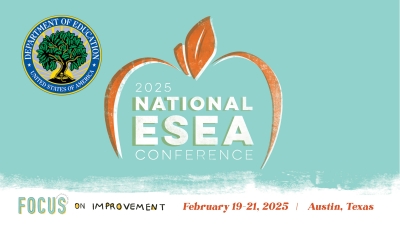Come hear updates from a panel of U.S. Department of Education leadership from the office of Elementary and Secondary Education and Office of Special Education Programs. The panel will discuss work from each office and intersection points around timely themes of equity considerations to improve student outcomes, opportunities for additional or novel uses of federal resources, family and caregiver engagement, and student attendance and engagement.

Patrick Rooney is the Director of School Support and Accountability. He oversees several key components of the Elementary and Secondary Education Act of 1965 (ESEA), including 21st Century Community Learning Centers; Title I, Part A; Title I, Part D; Title II; Title III; State Assessment Grants; Competitive Grants for State Assessments; McKinney-Vento Homeless Education; Well-Rounded Education through Student-Centered Funding; and 21st Century Community Learning Centers Out of School Time Career Pathway programs. Together, these programs award more than $20 billion annually to states and districts. Prior to this, Patrick was the Deputy Director in the Office of State Support from 2014 to 2018, where he oversaw many of these same programs. Patrick previously helped lead the work of the Reform Support Network, providing technical assistance to states implementing comprehensive Race to the Top reforms, and the Race to the Top Assessment program, which provided grants to groups of states to develop new assessments aligned to state’s college and career ready standards. Patrick also worked in the Office of Elementary and Secondary Education supporting states implement their accountability and assessment systems. Patrick previously worked in the DC Office of State Superintendent of Education, where he was a senior policy advisor and worked on a variety of K-12 issues in the District of Columbia. He started his career as a statistician in the National Center for Education Statistics, analyzing education trends for a variety of topics in the Congressionally mandated annual report, The Condition of Education.
Valerie C. Williams serves as the director in the Office of Special Education Programs (OSEP) within the Office of Special Education and Rehabilitative Services at the U.S. Department of Education. In this role, she is responsible for overseeing administration of the Individuals with Disabilities Education Act (IDEA), which authorizes formula grants to states under IDEA Part B and to lead agencies for the infants and families program under IDEA Part C. Williams holds a Bachelor of Arts in Political Economy of Industrial Societies from the University of California at Berkeley and a Master of Arts in Public Management from Johns Hopkins University. She has a unique perspective, having worked with members of Congress and staff on Capitol Hill, with advocacy organizations, supporting state special education leaders, and most importantly, being the parent of a son with Down syndrome.
Swati Adarkar most recently served as the National Policy Director for Start Early. Prior to this, Swati was the Co-Founder and President & CEO of the Children’s Institute in Oregon for 15 years, an early childhood policy and advocacy organization. Swati served on statewide advisory committees on early childhood for three Oregon governors. She provided the vision and leadership to launch and sustain the Early Works initiative which aligns birth to five services and supports with elementary school. For more than thirty years she has been a strong advocate for meeting the comprehensive needs of low-income children and families in Oregon and California and has a passion for ensuring the health and early school success of young children. Swati has served on the Advisory Boards of Attendance Works and the National P-3 Center. She holds a Bachelor of Arts in Communication Studies from UCLA and a Master’s in Public Administration from Harvard Kennedy School.
Ruth Ryder is the Deputy Assistant Secretary for the Office of Policy and Programs – Formula Grants in the Office of Elementary and Secondary Education (OESE) at the U.S. Department of Education. OESE implements programs to support disadvantaged students under the Elementary and Secondary Education Act as amended by the Every Student Succeeds Act, In this role, Ms. Ryder oversees a broad range of management, policy, and program functions related to formula and discretionary grant programs under the ESEA.
Ms. Ryder joined OESE in April 2019 and has responsibility for formula grants under Title I (Basic Grants, Assessment, Migrant and Neglected and Delinquent), II-A (Effective Educators), III-A (English Learners), IV-A (Student Support and Academic Enrichment), IV-B (21st Century Community Learning Centers) and National Activities for School Safety, Title V (Rural Education Achievement Program), Title VI (Indian Education) and Title VII (Impact Aid). In addition, OFG administers numerous discretionary grants related to Titles I-VI, including the Comprehensive Centers and Equity Assistance Centers.
During her time in OESE, Ms. Ryder has sought to improve coordination across ESEA programs, increase communication with State customers and partners, and streamline internal processes. In addition, Ms. Ryder is leading an effort to improve alignment of technical assistance both within OESE, as well as across the Department. These efforts have resulted in improved ability to meet grantee needs, reduced duplication of effort and increased return on investment. Ms. Ryder was previously the deputy director of the Office of Special Education Programs in the Office of Special Education and Rehabilitative Services, which she joined in 1988. In that position, she provided national leadership for moving special education accountability to a more results-oriented focus.
Prior to joining the Department, Ms. Ryder was a program administrator in a Washington state school district. There she had responsibility for the Elementary and Secondary Education Act Title 1 and Title II programs, state-remediation, gifted education, outcome-based education, and state- and district-wide testing programs. She also administered an ED-funded demonstration project, examining integrated service delivery models for including children with learning differences in general education. Additionally, Ms. Ryder has been a special education consulting teacher and a general education classroom teacher. Ms. Ryder has a bachelor’s degree in psychology and elementary education and a master’s degree in special education.








